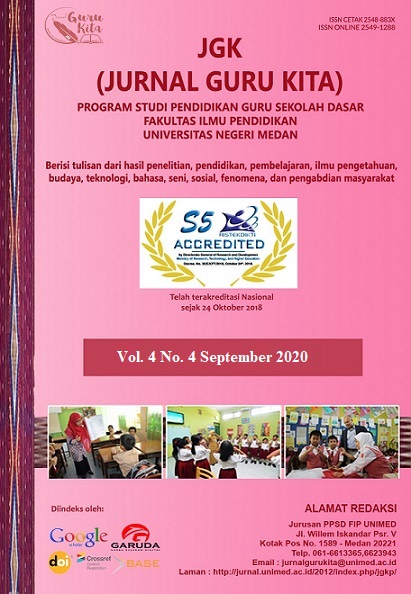KONSEPSI MANAJEMEN MUTU PENDIDIKAN
DOI:
https://doi.org/10.24114/jgk.v6i3.36781Keywords:
Conception of Quality EducationalAbstract
Abstract: Education Quality Management Concept. This journal aims to provide an explanation of the concept of quality, school quality and the quality of educational institutions. This journal also focuses on the quality of education managed by professional institutions through integrated quality management. Educational institutions as producers of the service sector must pay attention to the quality, the quality of the managerial and academic aspects. Both of these aspects can be achieved through the application of the concept of total quality management (TQM). TQM is a management concept that places all university personnel (academics) as individuals who have responsibility for quality in accordance with their duties and functions. Quality of education is the degree of excellence in managing education effectively and efficiently to give birth to academic and extracurricular excellence in students who are declared to have passed for one level of education or completed a certain learning program. National Education Standards aim to ensure the quality of national education in the context of educating the nation's life and shaping the character and civilization of a dignified nation. National Education Standards are refined in a planned, directed, and sustainable manner in accordance with the changing demands of local, national, and global life. Keywords: Conception of Quality EducationalReferences
Baharun, Hasan & Zamroni. 2017. MANAJEMEN MUTU PENDIDIKAN Ikhtiar dalam Meningkatkan Mutu Pendidikan Madrasah melalui Pendekatan Balanced Scorecard,Cet. I. Tulungagung: Akademia Pustaka
Deden Maqbullah. 2011. Manajemen Mutu Pendidikan Islam: Model Pengembang Teori dan Aplikasi Sistem Penjaminan Mutu.Jakarta: Rajawali Pers
Dedi Mulyanasa. 2012. Pendidikan Bermutu dan Berdaya Saing. Bandung: Remaja Rosdakarya
Depdiknas. 2007. Kamus Besar Bahasa Indonesia edisi . Jakarta: Balai Pustaka
Direktorat Madrasah Dan Pendidikan Agama Islam Pada Sekolah Umum. 2005. STANDAR NASIONAL PENDIDIKAN; Peraturan Pemerintah Republik Indonesia Nomor 19 Tahun 2005. Direktorat Madrasah Dan Pendidikan Agama Islam Pada Sekolah Umum, Jakarta
Edward Sailis. 2011. Total Quality Management in Education, penerjemah: Ahmad Ali Riyadi dan Fahrurrozi, Manajemen Mutu Terpadu. Yogyakarta: IRCiSoD
Eka Prihatin. 2014. Teori Adminitrasi Pendidikan. Bandung:Alfabeta
Fandy Tjiptono & Gregorius Chandra. 2011. Service, Quality & Satisfaction. Yogyakarta:Andi Offset
M.N. Nasution. 2004. Manajemen Mutu Terpadu. Cet. Ke3.Bogor : Ghalia Indonesia
Nur Hasan. 1994. Konvensi Nasional Pendidikan Indonesia, Kurikulum untuk Abad 21;Indikator Cara Pengukuran dan Faktor-Faktor yang Mempengaruhi Mutu Pendidikan. Jakarta: Sindo
Sudiyono. 2004. Manajemen Pendidikan Tinggi. Jakarta: Rineka Cipta
Uhar Suharsaputra. 2010. Administrasi Pendidikan.Bandung: Rafika Aditama
Umiarso dan Imam Gojali. 2011. Manajemen Mutu Sekolah di Era Otonomi Pendidikan. Yogyakarta: IRCiSoD
Downloads
Published
How to Cite
Issue
Section
License
Authors published with the JGK (Jurnal Guru Kita) agree to the following terms:
- Authors retain copyright and grant the journal the right of first publication with the work simultaneously licensed under a Creative Commons Attribution License (CC BY-SA 4.0) that allows others to share the work with an acknowledgment of the work's authorship and initial publication in this journal.
- Authors are able to enter into separate, additional contractual arrangements for the non-exclusive distribution of the journal's published version of the work (e.g., post it to an institutional repository or publish it in a book), with an acknowledgment of its initial publication in this journal.
- Authors are permitted and encouraged to post their work online (e.g., in institutional repositories or on their website) prior to and during the submission process, as it can lead to productive exchanges, as well as earlier and greater citation of published work. (See The Effect of Open Access)


























